You’ve finally made the decision to combine your two favorite roles (network & security engineer) to become a network security engineer.
Let’s dive right into network security engineering and explore the benefits.
What Is a Network Security Engineer?
A network security engineer’s role is to protect an organization’s information systems from unauthorized access due to network-related vulnerabilities.
They ensure the network infrastructure is secure and operates reliably while meeting (or exceeding) security compliance standards.
What Is the Salary of Network Security Engineer?
The average salary for network security engineer is about $127,654 per year.
Here’s what you can expect depending on your experience level:
- Entry-Level: $60,000–$80,000 per year.
- Mid-Level: $90,000–$120,000 per year.
- Senior-Level: $130,000+ per year.
How Much Does a Network Engineer Make Compared to a Network Security Engineer?
What’s really great is that network security engineers earn approximately 50% more than network engineers at the senior level.
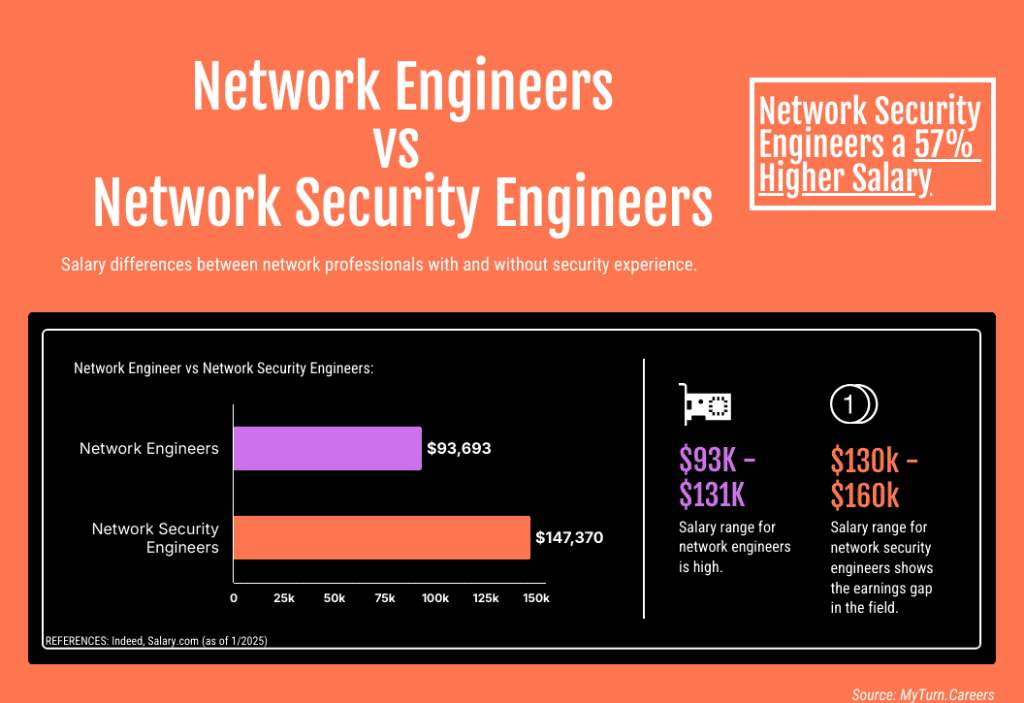
That should show you the premium placed on cybersecurity expertise.
Professionals in both roles earn competitive salaries, but network security engineers have two more advantages:
- Skills: Security engineers require expertise in both networking and advanced cybersecurity tools.
- Demand: Security-focused roles are experiencing a higher rate of growth. We’ll talk more about demand a bit later.
Are Network Security Engineers in Demand?
Yes, network security engineers are in high demand. Read below for more!
What Is the Job Demand for Network Security Engineer?
According to Zippia, 5% is the projected growth rate in the US between 2018 to 2028 for network security engineer jobs. Approximately 18,200 new jobs are expected over the next decade.
So, if you’re considering this career, rest assured you’re going to experience long-term job stability and growth opportunities.
Is Network Security Engineer Hard?
No, being a network security engineer isn’t hard, but it can be challenging.
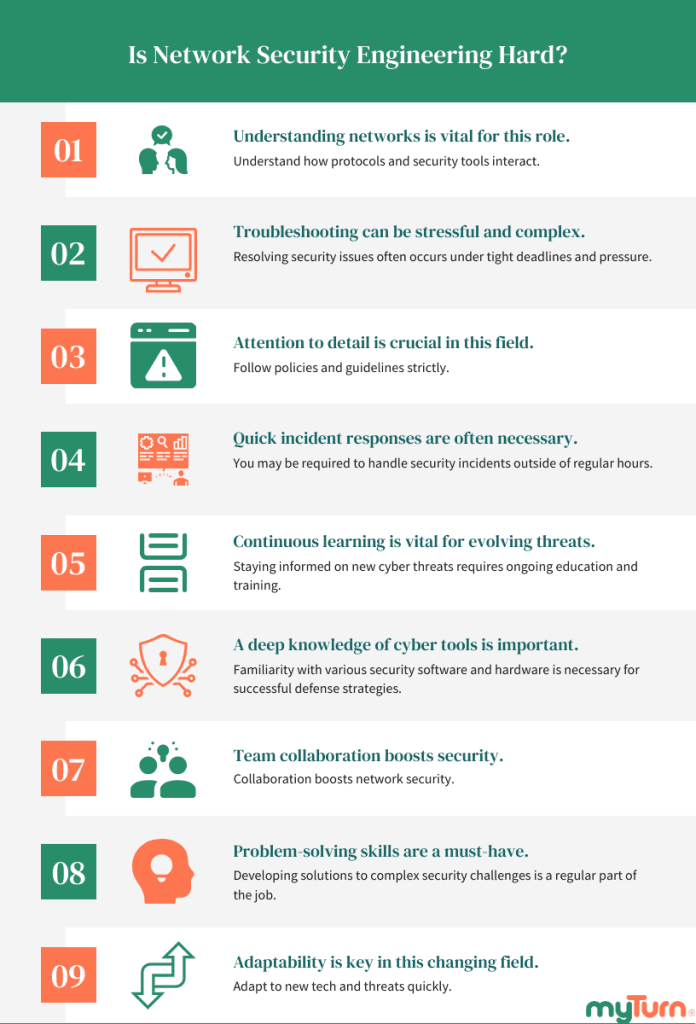
How hard you find it depends on your experience and passion for solving technical problems. You need to stay updated on the latest security threats, master various tools, and handle complex systems.
But, if you enjoy troubleshooting, learning, and staying ahead of cyber threats, this role can be very rewarding.
How Many Hours Do Network Security Engineers Work?
Regular tasks like monitoring, routine updates, and internal assessments typically fit within the standard workweek.
However, you’ll often attend to urgent, high-priority, or business-critical activities, such as incidents, major upgrades, and external audits. At that point, you could be putting in for overtime.
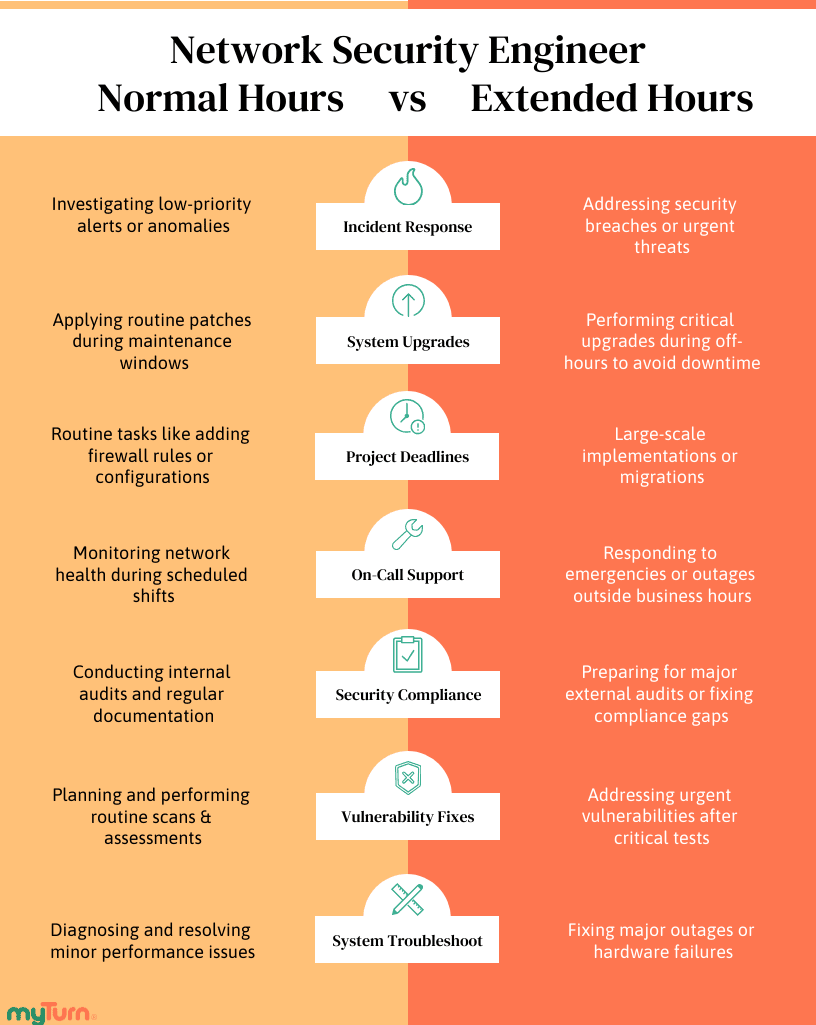
What Does a Network Security Engineer Do?
Network security engineers focus on hands-on implementation and management of network defenses.
Core Responsibilities
- Configure and maintain firewalls, VPNs, and intrusion prevention/detection systems (IPS/IDS).
- Enforce network access controls to prevent unauthorized access.
- Implement network segmentation to limit security risks.
- Update and patch security tools and devices to protect against vulnerabilities.
- Troubleshoot and resolve issues with network security systems.
- Monitor logs and alerts generated by security devices for unusual activity.
Testing & Assessments
- Conduct routine vulnerability scans on network infrastructure.
- Test firewall rules and configurations to ensure proper enforcement.
- Validate the effectiveness of intrusion prevention systems.
- Perform basic security tests on network devices (not full penetration testing).
Specialized Tasks
- Configure and manage advanced tools like Network Access Control (NAC) systems.
- Deploy and maintain secure wireless networks.
- Set up secure environments for IoT (Internet of Things) devices.
- Support encryption protocols for secure data transmission.
- Integrate and manage Data Loss Prevention (DLP) systems.
- Secure physical network access points, like routers and switches.
Rules & Regulations
- Ensure compliance with security policies, standards, and regulations.
- Document security device configurations, changes, and incident responses.
- Conduct internal audits of network security measures.
Team Collaboration
- Work with IT teams to design and implement secure network architectures.
- Support security incident response teams by providing network expertise.
- Collaborate with compliance teams to meet regulatory standards (e.g., GDPR, HIPAA).
- Assist penetration testing teams by providing network access and configurations.
Other Tasks
- Configure honeypots or decoy systems to detect and study attackers.
- Implement tools to protect against Distributed Denial of Service (DDoS) attacks.
- Manage secure networking for cloud platforms or hybrid environments.
- Provide security training for other IT staff on best practices.
- Research and recommend new security tools or technologies.
- Integrate physical and network security measures (e.g., camera systems, access control).
Do Network Security Engineers Code?
No, you don’t need to be a full-time coder, but many network security engineers do code.
Coding won’t be your primary focus, but it’s a useful tool for efficiency. It helps to automate tasks and troubleshoot security issues.
For example, you might use scripting languages like Python or Bash to streamline processes or analyze logs.
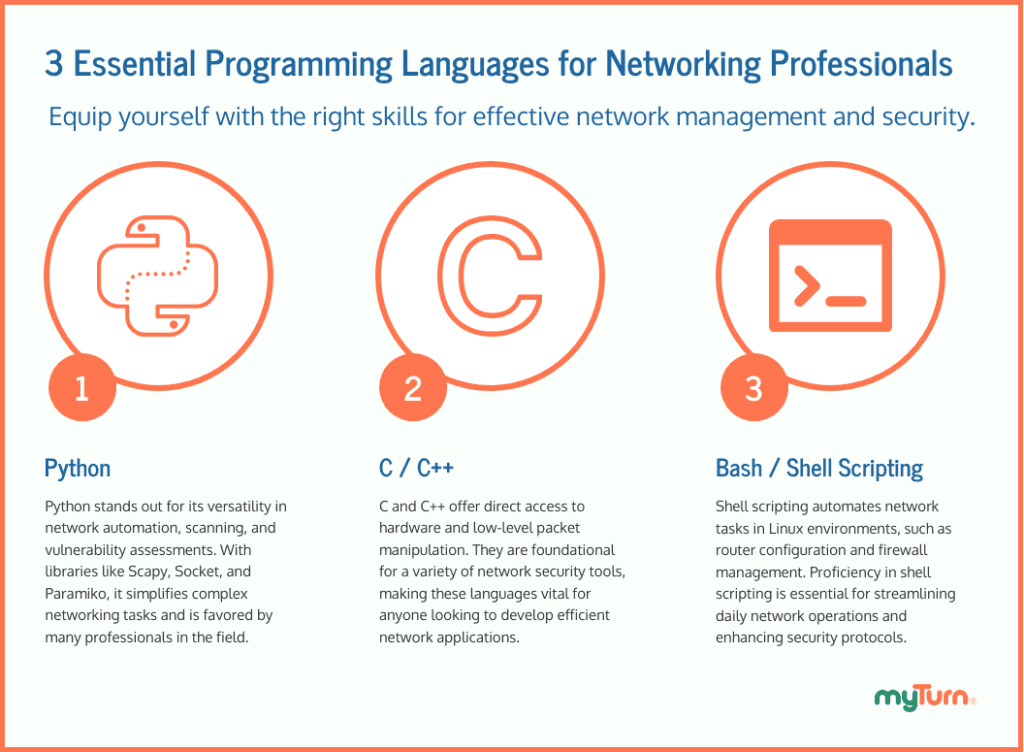
Other examples may include:
- Creating custom firewall or intrusion detection rules.
- Debugging network issues by analyzing system scripts or configurations.
Like I said, while coding isn’t mandatory, it’s extremely valuable and can make your job easier.
How To Become a Network Security Engineer?
To become a network security engineer, you need a combination of education, certifications, and hands-on experience…or at least 2 out of 3.
The most common-sense approach is to start by learning the basics of networking and security, then build your expertise through certifications.
Is There a Network Security Engineer Course I Can Take?
Yes, you can take a network security engineer training course but don’t expect it to substitute for actual experience.
Check out my article on cybersecurity bootcamps for more info.
Anyone that says you can learn network security engineering without having any networking background is fooling you.
What Skills Do You Need to Be a Network Security Engineer?
To excel as a network security engineer, you need strong technical skills in networking with a solid understanding of security.
Individual job descriptions may vary slightly depending on the specific needs of an organization or industry sector, but these areas provide a comprehensive foundation for the role.
Core Skills for Network Security Engineer
- Deep Networking Knowledge: Understanding of networking layers, protocols such as TCP/IP, UDP, DNS, and BGP, as well as subnetting, is essential for network security engineers.
- Security Tool Expertise: Proficiency with firewalls (e.g., Palo Alto, Fortinet), IDS/IPS, VPNs, and SIEM tools is crucial for monitoring and safeguarding network traffic.
- Operating Systems: Knowledge of Linux, Windows, and network operating systems like Cisco IOS are important for configuring and managing network security environments.
- Encryption Techniques: Understanding of encryption methods such as TLS, SSL, and PKI are necessary for ensuring secure communications.
- Access Control: Managing Network Access Control (NAC) systems and implementing role-based access controls (RBAC) are key responsibilities.
- Scripting and Automation: Skills in scripting and automation using tools like Python, Ansible, or PowerShell is valuable for streamlining security tasks.
- Compliance and Governance Expertise: Ensuring networks meet regulatory standards such as GDPR, HIPAA, and PCI-DSS is an integral part of a network security engineer’s role.
Problem-Solving and Analytical Skills
- Incident Response: Ability to act quickly during breaches or suspicious activity.
- Root Cause Analysis: Determining the underlying causes of security issues.
- Log Analysis: Reviewing logs from firewalls, SIEMs, and other sources to identify threats.
- Risk Assessment: Evaluating and mitigating potential vulnerabilities in the network.
Programming and Automation Skills
- Scripting: Proficiency in Python, Bash, or PowerShell for automation.
- Network Automation: Familiarity with tools like Ansible or Terraform to streamline network configurations.
- API Integration: Leveraging APIs for managing security tools and systems.
Compliance and Governance Skills
- Policy Development: Creating and enforcing security policies.
- Regulatory Knowledge: Familiarity with standards like GDPR, CCPA, HIPAA, and PCI-DSS. Focus on what makes sense for the roles you’re going after.
- Audit Support: Preparing for and supporting internal and external compliance audits.
Rare or Specialized Skills (more listed later)
- Honeypots and Decoys: Setting up systems to study attackers.
- Malware Analysis: Understanding and mitigating malicious code.
- Forensics: Basic knowledge of investigating security incidents.
- SCADA Security: Securing industrial control systems and critical infrastructure.
- Quantum Cryptography Awareness: Understanding emerging cryptographic technologies.
Advanced Skills
- Cloud Security: Familiarity with securing cloud platforms like AWS, Azure, or Google Cloud.
- DDoS Protection: Experience with tools and techniques to mitigate distributed denial-of-service attacks.
- Secure Wireless Networks: Expertise in setting up WPA3 and enterprise-grade wireless security.
- Zero Trust Security: Implementing Zero Trust architectures for better access control.
- IoT Security: Knowledge of securing Internet of Things (IoT) devices and non-traditional endpoints.
These additional skills and traits can enhance your effectiveness and make you a more versatile network security engineer.
Let’s review some of your network security engineer education requirements.
Do You Need a Degree to Be a Network Security Engineer?
You don’t need a degree to become a network security engineer, but it definitely helps!
But before you decide against it, continue reading.
How To Become a Network Security Engineer Without a Degree?
If you decide not to get a degree, focus on self-learning. This means getting your certifications and as much hands-on experience as you can find.
Step 1: Build a strong foundation in networking concepts and gaining practical experience.
- Learn Networking Basics: Study networking concepts like TCP/IP, routing, and switching using free or paid online courses, labs, or tools like Cisco Packet Tracer.
- Earn Networking Certifications: Start with industry-recognized certs like CompTIA Network+, CCNA (Cisco Certified Network Associate), or Juniper JNCIA-Junos to validate your skills.
- Build a Portfolio: Showcase practical skills by completing projects, such as setting up home labs or configuring virtual networks.
- Gain Practical Experience: Work in entry-level IT roles, like help desk support or network technician, to build foundational knowledge. If you need help breaking in, start leveraging internships, apprenticeships, or a professional network (i.e. Meetup, industry conferences, etc.).
Continuously find more ways to expand your knowledge and gain as much networking experience as possible.
Step 2. Build your security foundations.
Once you have enough network engineering experience, start building on your existing skills by earning certifications and gaining hands-on experience in security-specific tasks. Here’s how you can make the switch:
- Earn Security Certifications: Start with CompTIA Security+ or CCNA Security to validate foundational security skills. Progress to advanced certs like CISSP, Fortinet NSE, or CCNP Security for specialized expertise.
- Expand Your Skills: Learn to configure and manage firewalls, intrusion detection/prevention systems (IDS/IPS), and VPNs. Focus on tools like Palo Alto firewalls or Fortinet.
- Practice Hands-On Security Tasks: Use labs (e.g., TryHackMe, Cisco Packet Tracer) to simulate real-world security scenarios, such as detecting and mitigating threats.
- Learn Threat Management: Study how to monitor logs, identify vulnerabilities, and respond to incidents using tools like Splunk or Wireshark.
- Leverage Current Role: Volunteer for security-related projects in your existing position, like securing network segments or performing vulnerability scans.
- Network and Apply: Connect with professionals in cybersecurity forums and apply for entry-level security roles like network security analyst or junior network security engineer.
If you can build on top of your networking experience, then demonstrate your security knowledge through certifications and projects, you’re much more likely to break into network security without a degree.
What Degree Do You Need for Network Security Engineer?
Many employers (not all) typically request a bachelor’s degree in a field related to IT or cybersecurity to become a network security engineer.
If you decide to move forward with a degree, consider majoring in one or two of these relevant network-related degrees:
- Network Engineering: A MUST and allows you to design and manage network infrastructures.
- Cybersecurity: Focuses directly on protecting systems and networks.
- Computer Science: Provides broad knowledge in programming, algorithms, and systems.
- Information Technology (IT): Covers networking, system administration, and security.
Employers love when you’ve got experience, but a degree gives you an extra advantage over others.
Should I Get a Network Security Engineer Certification?
Yes, you should get a network security engineer certification. Here’s why:
- Skill Validation: Certifications demonstrate your expertise in network security tools and practices.
- Job Market Advantage: Getting network security certifications like CCNA Security or Fortinet NSE gives you a competitive advantage. I’ll provide a list of certifications below.
- Higher Salaries: Certified professionals typically earn more than their non-certified counterparts.
- Specialized Knowledge: Certifications teach you about the security aspects of networking. This is knowledge you may not have acquired as a network engineer (ex. VPNs, intrusion prevention and detection systems, compliance requirements, etc.).
- Career Growth: Advanced certifications like CISSP or CCNP Security can open doors to senior-level roles.
What Network Security Engineering Certifications Are There?
If you want to become a certified network security engineer, there are several beginner and intermediate level certifications that’ll help you:
Entry-Level Certifications
- CompTIA Network+
- A general networking certification that introduces the basics of managing, troubleshooting, and configuring network devices.
- CompTIA Security+
- A foundational certification covering basic security principles, such as network security, threat management, and access control. Ideal for beginners entering the field.
- Cisco Certified Technician (CCT)
- Focuses on diagnosing, repairing, and maintaining Cisco network systems. A good starting point for those working with Cisco equipment.
- Certified Network Defender (CND) by EC-Council
- Covers basic network defense strategies, including identifying vulnerabilities, managing firewalls, and ensuring network continuity.
- Fortinet Certified Fundamentals (Cybersecurity)
- Entry-level certifications that cover foundational security awareness and introduce Fortinet’s cybersecurity products and tools.
Intermediate-Level Certifications
For professionals with foundational knowledge seeking more advanced skills:
- Cisco Certified Network Associate (CCNA) Security
- Focuses on securing Cisco networks, covering topics like firewall configuration, VPNs, and access control.
- Juniper Networks Certified Specialist Security (JNCIS-SEC)
- A specialization in Juniper security products, covering topics like security policies, VPNs, and troubleshooting.
- CompTIA Cybersecurity Analyst (CySA+)
- Teaches proactive defense methods, including threat detection, vulnerability management, and incident response.
- Checkpoint Certified Security Administrator (CCSA)
- Focuses on managing Checkpoint firewalls, creating security policies, and monitoring network activity.
- Certified Ethical Hacker (CEH)
- Provides knowledge on offensive tactics to understand and secure network vulnerabilities. Focuses on penetration testing and hacking methods.
- Palo Alto Networks Certified Network Security Engineer (PCNSE)
- Validates expertise in configuring and managing Palo Alto Networks’ security platforms, including firewalls and threat prevention.
These certifications build the foundational and intermediate skills you need to excel in network security and prepare for advanced roles.
How Long Does It Take to Become a Network Security Engineer?
Your total journey to becoming a network security engineer typically takes about 4 to 6 years, depending on your educational and professional path.
This includes the time it takes to get a bachelor’s degree, followed by 1 to 2 years of gaining hands-on experience.
Some people shorten this timeline with certifications or accelerated programs.
- Education: 4 years for a bachelor’s degree (optional, but preferred).
- Certifications: 3-6 months each for key certs like CCNA, Fortinet, or CISSP.
- Experience: 1 to 2 years in entry-level IT roles like network administrator or security analyst.
If you focus on certifications and hands-on learning, you can enter the field faster, but combining education, certs, and experience is the most comprehensive path.
What Is the Future of Network Security Engineer?
It’s great! You’ve got emerging trends like cloud computing, IoT, and AI-driven attacks that require professionals to stay updated on cutting-edge tools and strategies.
Specializing in areas like cloud security or automation can enhance your career prospects.
- Cloud Security: Increased demand for securing cloud infrastructures.
- IoT Protection: Growth in IoT devices expands the need for network security.
- Zero-Trust Architectures: Companies are focusing on strict access controls.
- Automation: Skills in network automation tools like Ansible are becoming essential.
- AI Threats: Engineers must address AI-driven cyberattacks and defenses.
If you stay adaptable and continuously enhance your skills, this field offers long-term growth and stability.
Can a Network Security Engineer Work from Home?
Yes, network security engineers can work from home for many tasks, especially if you’re focusing on monitoring, configuring, and troubleshooting networks using remote tools.
However, some situations may require on-site presence, such as physical hardware maintenance or responding to critical incidents.
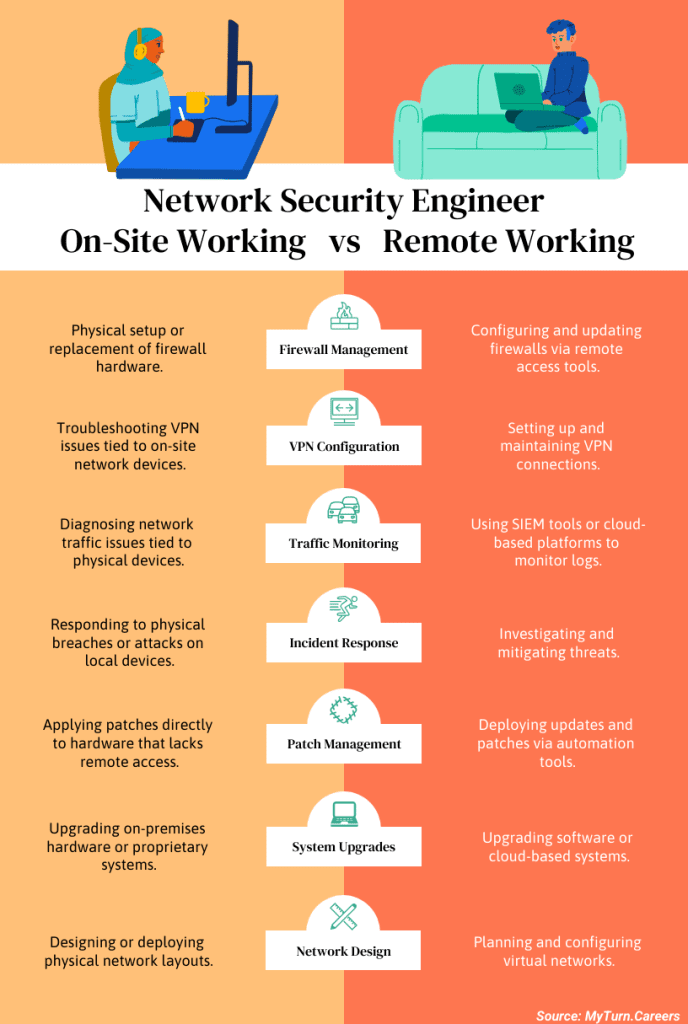
- Remote Work: Most tasks involving monitoring, configuration, and software can be done remotely.
- On-Site Work: Physical device management, local upgrades, and hardware troubleshooting often require on-site presence.
What Is the Difference Between Network Engineer and Network Security Engineer?
A network engineer focuses on designing, implementing, and maintaining network infrastructure to ensure connectivity and performance. In contrast, a network security engineer specializes in protecting networks from cyber threats and unauthorized access.
While both roles require strong networking knowledge, their objectives differ: network engineers prioritize functionality and efficiency, whereas network security engineers emphasize protection and defense.
What Is the Difference Between Cyber Security Engineer and Network Security Engineer?
A cybersecurity engineer is a broader role that focuses on protecting an organization’s entire digital environment, including networks, systems, software, and data. In contrast, a network security engineer specializes specifically in securing computer networks from threats like unauthorized access, data breaches, and malware.
Read the Difference: Cyber Security vs Network Security
While their roles overlap, cybersecurity engineers have a broader scope, while network security engineers focus more on the network infrastructure.




“This blog provides a comprehensive and insightful guide for anyone aspiring to become a Network Security Engineer. The step-by-step approach, along with valuable tips on essential skills and certifications, makes it a must-read for both beginners and professionals looking to enhance their careers in cybersecurity. Great job on simplifying complex concepts!”
Rashmi, I’m thrilled that you found the article helpful!
Thank you so much for this comprehensive guide on becoming a Network Security Engineer! The information provided is incredibly detailed and will definitely help me as I pursue this career path.
I’m glad it helped you!